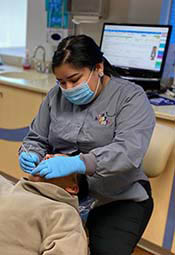Whether you have minor issues with your mouth or need a major overhaul, your oral health should not be taken lightly. Your mouth is the gateway to your overall health. Your body needs nutritious foods, and you need your teeth to eat healthy foods! Good for you, for seriously digging in to determine whether a dentist vs orthodontist is the specialist you need.
Dentist vs. Orthodontist: Doing the Background Check
First, a dentist vs orthodontist will have similar educational backgrounds. Both must get a bachelor’s degree and then apply for dental school. If accepted into dental school, they must complete a four-year doctoral program. After graduation, a general dentist may begin to practice dentistry. Dentists will earn either a D.D.S. (doctor of dental surgery) or D.M.D. (doctor of dental medicine) degree. Both degrees require the same curriculum, but schools will call them one or the other.
At this point, to become an orthodontist, the dentist must then serve a two- or three-year residency in orthodontics at an American Dental Association approved university-affiliated program. Ideally, an orthodontist will be certified by the American Board of Orthodontics, the only orthodontic specialty board recognized by the American Dental Association. An orthodontist will typically tag his or her name with D.D.S. or D.M.D., as well as “M.S.”, for Master of Science.
So in comparing the educational backgrounds of a dentist vs orthodontist, both require extensive schooling before practicing. A dentist must complete 8 years of higher education while an orthodontist has to complete 10 or 11 years in order to specialize.
Does Your Oral Issue Call for a Dentist or Orthodontist?
Now you know that both dentists and orthodontists have an extensive educational background before they start practicing their profession. And orthodontists are more specialized with higher education. But which one do you need for your dental issue?
Typically your primary care dental provider, a dentist will diagnose, treat and manage your overall oral health care. This includes performing routine dental work like check-ups, cleanings, and X-rays. But a dentist will also remove or repair problem teeth, fill cavities and make models for dentures. A dentist office employs several dental hygienists, who typically take care of your X-rays and cleaning while helping the dentist with other tasks as needed.
Some dentists complete additional coursework and offer orthodontic services. But more often, if you need treatments or procedures outside the dentist’s scope of expertise, he or she will refer you to another type of dental specialist. As an example, if your teeth need realignment, your dentist will refer you to an orthodontist.
Dental Treatments
- Gum care
- Root canals
- Fillings
- Crowns
- Veneers
- Bridges
- Teeth whitening
An orthodontist specializes in the alignment of your teeth and jaws using non-surgical procedures. He or she will diagnose, prevent and treat “malocclusions”, or bad bites. So you may be referred to an orthodontist if you have an overbite, underbite, gaps or overcrowded teeth. Your orthodontist will determine which treatment will straighten your teeth and retrain your mouth muscles best.
Orthodontic Treatments
- Wires
- Invisalign
- Braces
- Retainers
- Other corrective appliances
Some orthodontists work in separate offices from dentists. But some dental providers like MyOrthodontist have both dentists and orthodontists on site to make taking good care of your teeth more convenient, comfortable and reliable.
It’s Important to Maintain Healthy Oral Care
Of course, by taking care of your teeth, you will look better, with a cleaner and brighter smile. But more importantly, you will keep as many of your natural teeth longer by avoiding tooth decay, periodontal disease (gum disease) and other mouth diseases. These oral health issues can lead to even bigger problems like obesity, malnutrition and even heart disease. Check out Periodontal Disease and Heart Health to see why experts may now be linking heart disease to periodontal disease.
Just one bad tooth can start a domino effect in your mouth. Left untreated, it can result in infection, loss of jawbone and movement of your other teeth. Thus the domino effect begins. It’s smarter and cheaper to treat one tooth now than to treat several teeth later.
So, get preventive check-ups with your dentist regularly to ward off any dental issues. And when a toothache or other issue crops up in your mouth, schedule an appointment immediately instead of waiting for your next 6-month check-up to come around!
Switch to a Brighter Smile
Currently, at MyOrthodontist, we are offering a new patient special. Take advantage of our healthier smile package at any of our conveniently located North Carolina offices in Raleigh, Wake Forest, and other cities in North Carolina to better serve you! Visit with us today – you’ll be glad you did!


